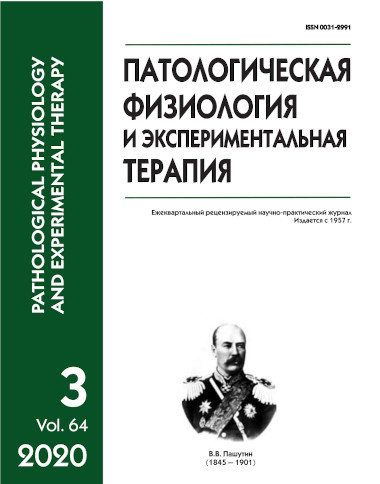The role of neuropeptides in the development of postoperative cognitive dysfunction in patients with coronary heart disease after coronary artery bypass grafting
Abstract
Currently, a search is underway for sensitive methods for diagnosing brain damage. Among biochemical markers, concentrations of neurospecific proteins in various biological fluids is being actively studied. The aim of this study was to analyze concentrations of neuropeptides in patients with coronary heart disease (CHD) who developed postoperative cognitive dysfunction after coronary artery bypass grafting (CABG). Methods. Serum concentrations of protein S100 (S100β), neuron-specific enolase (NSE), basic myelin protein (MBP), brain-derived neurotrophic factor (BDNF) and nerve growth factor (NGF) in blood serum were studied in 40 patients aged 52 to 75 years after CABG. To identify cognitive impairment, the Montreal Cognitive Assessment (MoCA) scale was used before the surgery and on postoperative day 7. The first group included 23 patients with a decrease in MoCA scale scores after CABG by less than 3; the second group included 17 patients with decreased scores by more than 3. Serum concentrations of neuropeptides were measured by ELISA before and after surgery, and at 24 h and 7 days after surgery. Results. During the entire period of monitoring, patients of group 2 had more pronounced increases in S100β and NSE, which was due to activation of the pro-inflammatory response, prolonged neuroinflammation, and significant damage to neurons in postoperative cognitive dysfunction. In group 2, the content of NGF gradually increased after surgery and reached a maximum by postoperative day 7 days, which may indicate activation of compensatory processes in response to the action of damaging factors. The BDNF concentration was higher in patients of group I both before and after surgery, which suggested neuroprotective properties of this protein. Patients of group 2 had higher MBP concentrations throughout the study, which may indicate more significant damage to oligodendrocytes than in group I. Conclusion. The damage to the central nervous system in patients with postoperative cognitive dysfunction results from excessive activation of the proinflammatory response and longer maintenance of neuroinflammation, pronounced injury of neurons and oligodendrocytes, and insufficiency of BDNF, which results in reduced neuronal neuroplasticity. A considerable increase in MBP and shortage of BDNF in patients with postoperative cognitive dysfunction before the surgery requires further study of these indexes as predictors and markers for development of postoperative cognitive dysfunction in CHD patients before CABG.






